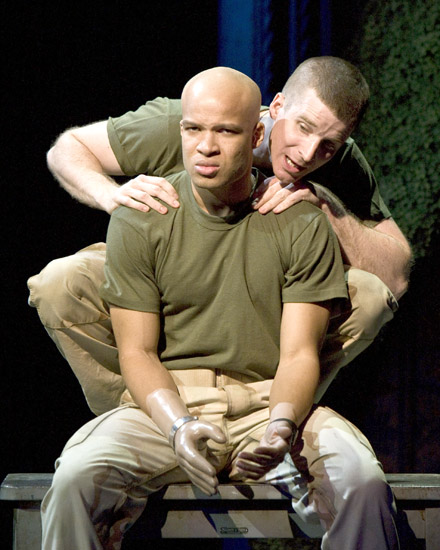In 2003, during the first year of the Iraq War, The Associated Press ran a small piece which detailed an incident at the Baghdad Zoo. A prized Bengal tiger bit off the hand of an American soldier during feeding time. It was then shot and killed by another soldier.
What seemed like a small event at the time ended up being the source of inspiration for Rajiv Joseph’s play, “Bengal Tiger at the Baghdad Zoo.”
“It was a way of understanding the place in a different way and the concept of us being at war (in Iraq),” Joseph said, “I had not thought about Baghdad having a zoo … a place where people went for leisure.”
Yet the incident at the Baghdad Zoo, and by proxy, the Iraq War, is merely a jumping off point to the bigger issues in the play, such as the search for home and that existential question of “Why am I here?”
All of that is coupled with characters that walk a fine line between life and death ““ they are in a war environment, after all.
“The play deals in a great way with life after death, and when you have characters who are experiencing that and who are frustrated by that ““ it leads to a spiritual quandary,” Joseph said. “That is on the crux of the character arc for every character in the play.”
“Bengal Tiger” opened last year at the Kirk Douglas Theatre in Culver City. The original production company, Center Theatre Group, has reopened the show again this year at the much bigger Mark Taper Forum in downtown Los Angeles.
This year’s production comes with an added piece of publicity. Just last Monday, the play was announced as a finalist for the Pulitzer Prize for drama.
While the news may have come as a surprise to Joseph, for Moisés Kaufman ““ a Tony and Emmy-nominated director, who had previously directed the Pulitzer-prize winning play “I Am My Own Wife” ““ the potential for greatness was apparent from the start.
“I knew from the first day I read it. … I thought, “˜This (play) is new, this is daring and this is so incredibly relevant to our lives as Americans,'” he said.
“Bengal Tiger” returns with its original ensemble cast and crew, one of which is a UCLA alumna. Sheila Vand, who graduated in 2007 with a degree in theater, plays two roles within the piece. This is the first time that she has ever originated a role, and Vand finds the experience liberating.
“There’s no one who’s come before you,” she said. “You kind of get a blank slate and the choices you make become a part of the original mold of the story.”
Vand was initially attracted to the project when she heard that Kaufman would be directing. Yet, she did not actively request an audition until she found that the play contained a role that was very rare in theater: the Middle Eastern woman. Vand is Iranian and the play’s topic of displacement was one that hit very close to home.
“My parents immigrated to the U.S. from Iran about 25 years ago. … It was the same situation where they were displaced from their community and their culture,” she said.
Vand plays two roles in “Bengal Tiger.” One of the roles requires her to speak entirely in Arabic ““ which she had to learn ““ to an audience that would, in all likelihood, not understand her.
“I find myself constantly trying to figure out what was more important, sounding like an authentic Iraqi or to make sure people understand what I was saying even though they don’t speak the language,” she said.
Yet that sense of alienating the audience is intentional, according to Joseph, who sees it as adding to the authenticity of the play. It also adds to another thematic strand, that of miscommunication.
“Part of the experience and part of the folly of the American involvement in Iraq over the past years is rooted in miscommunication, whether that be linguistically or culturally,” he said. “It’s very important for me that the audience be confused … (because) you relate to both the Iraqi and American characters.”
Though the play deals with issues that can be seen as very dark, in a place that has become associated with negativity in the American psyche, part of its appeal is the humor intertwined throughout the piece.
Sometimes it is through a talking tiger musing about religion or an Iraqi translator practicing a knock-knock joke.
“I think the play is very whimsical in all of its seriousness, and I think what Rajiv did so brilliantly and so seamlessly is pull the darkness and absurdity into something that is very theatrical,” said Kaufman.
